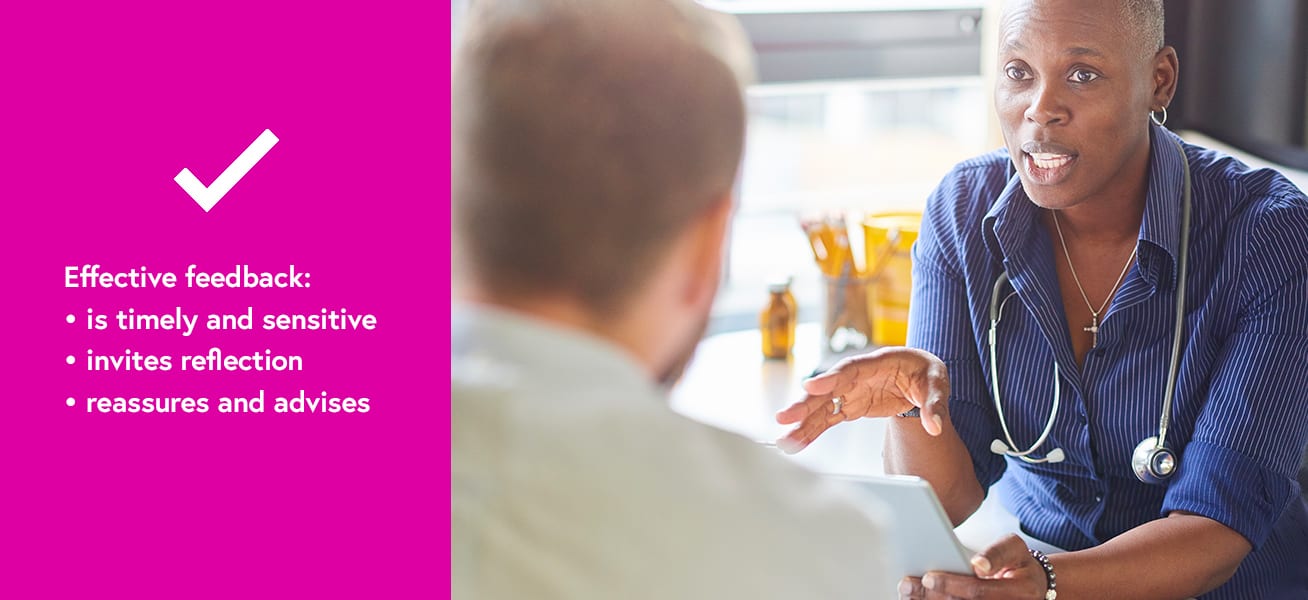How to provide effective feedback in clinical supervision
Ahead of the course from UEA, Clinical Supervision with Confidence, the team behind the course take a look at exactly what makes feedback unhelpful or effective when it comes to clinical supervision.
Ahead of the course from UEA, Clinical Supervision with Confidence, the team behind the course take a look at exactly what makes feedback unhelpful or effective when it comes to clinical supervision.
The Scenario
You have a new trainee in your clinical department or service. You’ve heard from others that this trainee seems quite slow in performing clinical tasks. This has led to their peers and other colleagues having to pick up and help with tasks to complete them in time.

An example of unhelpful feedback
The supervisor encounters an example of the trainee’s slow progress one day and remarks loudly to the trainee that they should really hurry up and finish their tasks so that other colleagues don’t have to end up covering for them. The trainee is startled and seeing that patients and staff have stopped what they were doing when they heard the supervisor shout, turns and walks out of the ward in embarrassment.
Why is this unhelpful?
This type of feedback is unhelpful because although it is timely (immediate), the trainee is taken by surprise and the comment was made loudly, in an inappropriate setting (where patients and staff were present and could hear). The trainee might have felt that they were doing their best to complete their tasks properly. As they lacked self-confidence, they might have tended to go over things again and again, as they were worried that they might miss something. None of the trainee’s colleagues had previously mentioned that they felt unduly burdened so the trainee had assumed that others were happy to help out a newbie. The trainee becomes embarrassed to go back to the ward to complete their remaining tasks.

An example of effective feedback
The supervisor encounters an example of the trainee’s slow progress one day, and during a quiet, private moment, asks the trainee how they feel they are getting on in the new placement. The trainee tells them that they think they are doing fine as they are doing their best to complete everything properly, even going over things again and again to make sure they had not missed anything. The supervisor then asks them whether going over things repeatedly had been helpful and the trainee looking relieved says that they hadn’t missed anything so far. They also ask the trainee if they felt they were managing to keep up to speed with tasks or whether there were times when the tasks built up and other colleagues had to get involved and help. The trainee says that as nobody had said anything about it they had assumed that others were happy to help out the newbie.
The supervisor and the trainee discuss a few of the tasks carried out that day with the supervisor reassuring the trainee that they had followed the correct procedure each time and that perhaps there was no need for them to keep going over things repeatedly. The supervisor then asks the trainee if they could think of anything that might help them stop worrying so much. The trainee can’t immediately think of anything so the supervisor suggests that they could ask them or a more senior trainee for advice on anything they found difficult so that the trainee could finish tasks in a timely manner, saying that it was ‘normal’ to feel worried while they were new to the placement.
Why is this effective?
We would say this is effective feedback because it was timely and done sensitively, asking the trainee to reflect on their performance first, and reassuring them to improve their self-confidence. Finally, the supervisor also supported the trainee in identifying solutions themselves, making suggestions where appropriate, to help the trainee feel safe; this included offering to support and advise on tricky issues.

To find out more about clinical supervision, and to improve your confidence supervising others – join Clinical Supervision with Confidence today.




